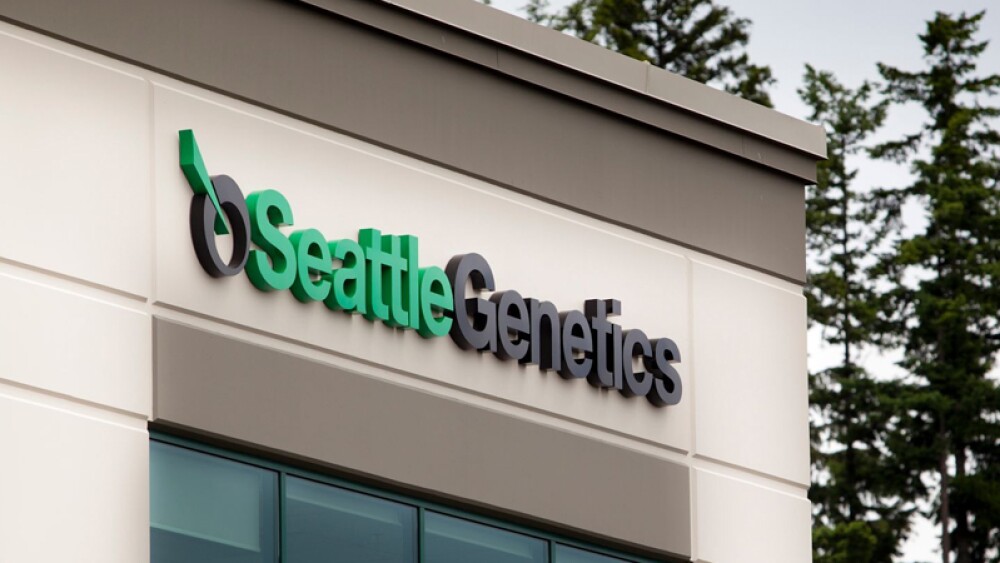June 26, 2017
By Mark Terry, BioSpace.com Breaking News Staff
Seattle Genetics and Takeda Pharmaceutical Company announced positive results from the Phase III ECHELON-1 clinical trial in previously untreated advanced classical Hodgkin lymphoma.
The trial evaluated Adcetris (brentuximab vedotin) plus Adriamycin, vinblastine, decarbazine versus standard of care, Adriamycin, bleomycin, vinblastine, dacarbazine (ABVD). One of the issues with ABVD is bleomycin, which has been associated with higher rates of lung toxicity.
In the trial, the Adcetris-combination group showed a statistically significant improvement in modified PFS versus the control group. The two-year modified PFS rate for the Adcetris-combo group was 82.1 percent compared to the control arm’s 77.2 percent. Perhaps more importantly, the Adcetris-control group appeared to have a better safety profile than the control group, although there was an increased incidence of febrile neutropenia and peripheral neuropathy.
John Carroll, writing for Endpoints News, noted, “The Adcetris combo hit a two-year modified PFS rate of 82.1 percent compared to 77.2 percent in the control arm—a 4.9 point, or 6 percent, improvement. That’s statistically significant, but not the wider, double-digit margin that the bulls have been looking for, according to a recent deep dive on this subject from Leerink. Analysts there have noted that without a 10-percent-plus margin in its favor, payers may just stick with the cheaper standard. The difference could amount to hundreds of millions of dollars for Seattle Genetics by 2025.”
Investors were closely watching the results of this trial after Seattle Genetics abandoned a $2 billion deal with Immunomedics after shareholders tossed out Immunomedics’ top executives earlier this year. In February, Seattle Genetics agreed to pay $250 million upfront to license a drug for solid tumors from Immunomedics (IMMU). Future milestone and royalty payments could have hit $2 billion. But after the proxy challenge to board members of Immunomedics, a restraining order was placed on the deal and the two companies agreed to terminate the license for IMMU-132.
The company also recently halted a Phase III trial of SGN-CD33A (vadastuximab talirine) in acute myeloid leukemia after higher rates of death, including fatal infections.
Although today’s announcement is good news, it’s probably not a slam-dunk. Seattle Genetics plans to file for first-line treatment approval for Hodgkin’s lymphoma with the U.S. Food and Drug Administration soon. The company indicates it will likely charge $100,000 to $120,000 for the average Hodgkin patient.
Matthew Herper, writing for Forbes, notes that while Seattle Genetics stock grew dramatically last year, it has only grown 17 percent this year, which is about half of the biotech indices. And shares, he writes, “sank last week after studies of an experimental drug, vadastuximab talirine, were stopped due to an elevated death rate with the treatment.”
And there is likely to be some nitpicking over the trial design and the company’s use of modified PFS. John Carroll writes, “Rather than stick with tracking the time until disease progression, researchers modified the endpoint to include the use of an additional therapy for patients who had a ‘certain lack of response,’ says the CEO (Clay Siegall), who added that that is a simplistic definition. If approved, says Siegall, this would be Adcetris’ 5th OK, with earlier expansions helping to continue to widen the market for their drug.”
“We think Adcetris has an excellent chance of being a billion-dollar drug in the U.S.,” Siegall told Carroll.
Maybe. Approval seems likely, but whether insurers will opt for it over standard of care is an open question.
Seattle Genetics is currently trading for $57.





